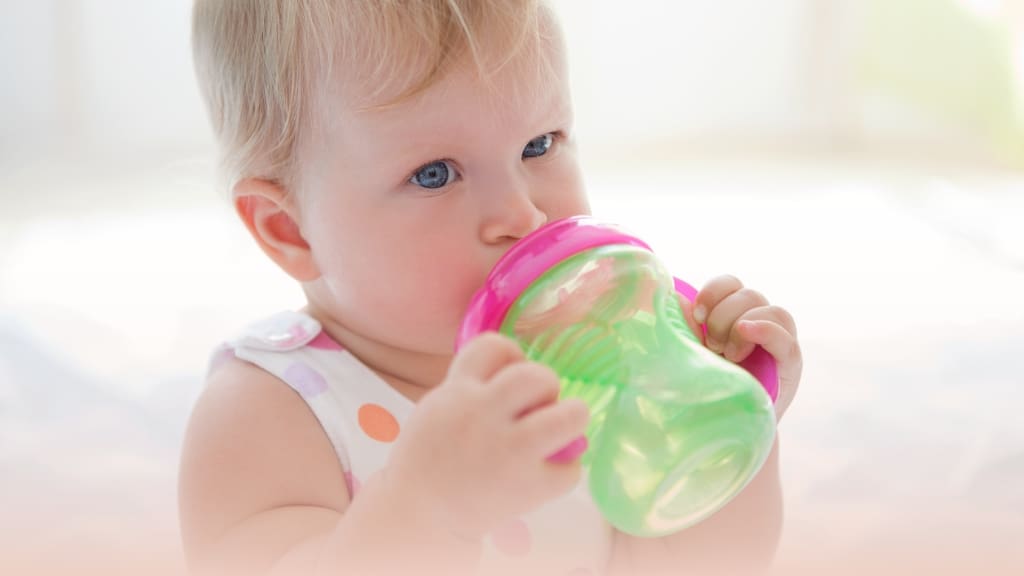
Table of Contents
When can you give a baby water? The question itself seems unnatural, right? But there is legitimate evidence why babies should not be given water until a few months old. According to the World Health Organization (WHO), breastfed babies do not need additional water as human milk itself is composed of 80% water. Then, what about formula-fed babies? Baby formula is synthesized to mimic breast milk and contains a significant amount of water. Hydration is not a concern for breastfed or formula-fed babies.
So when can babies drink water? When you begin introducing them to solids, you can give them 4 to 8 oz of water every day in a little sippy cup. We have answered all the common queries on when can babies drink water and more. Keep reading to uncover more about the effects of giving water to babies less than 6 months of age and the different ways of keeping your solid-fed babies hydrated.
Can Babies Drink Water?
Yes, babies can drink water once they are 6 months old and have started their solid food diet. These first foods are basically pureed forms of fruits or vegetables. They do contain water but it is not enough to keep them hydrated. This is the time when they need to have additional water in their diet. Get a cute, open sippy cup with a straw to feed them their daily dose of H2O.
According to the Children’s Hospital of Philadelphia, a 6-month-old baby’s milk intake reduces when solid foods are introduced. Milk intake typically stays in the range of 30 to 42 ounces to 28 to 32 ounces every day.
Once the child is 12 months old (or a year old), their milk intake further reduces to a maximum of 16 ounces per day. The Children’s Hospital in Orange County suggests that they be fed around 8 ounces of water every day.
Can Newborns Drink Water Without Any Risks?
No. Feeding newborns water can lead to certain health issues. Let’s go through a breakdown of these facts:
- Feeding water to newborns can lower their nursing appetite. The less they nurse (breastfeed), the more their appetite will be lost. This leads to high bilirubin levels and weight loss.
- Breast milk already has a ton of water content. Feeding newborns additional water can lead to water intoxication. It lowers the nutrient levels in the body and leads to health issues.
- Too much water in their fragile bodies can make their kidneys flush out electrolytes (including sodium). This causes an imbalance in the body.
How to Keep Your Child Hydrated
For most babies, giving them access to water is enough for them to drink it but if yours is a little fussy about normal hydration, you could jazz up the taste of water a little bit to make it more interesting. Here are some tips you could follow:
- Fresh fruits juices (limit it to 4 ounces per day)
- Give them fruits and veggies with high water content such as grapes, watermelons, cucumbers, etc.
- Make popsicles and ice cubes as they are easily attracted by colors and shapes.
- Introduce special fun drinkware and straws that they would be eager to drink from.
- Encourage them to take small sips frequently.
- Kids cannot regulate their body temperature as easily as adults so give them water before or after any activity (4 ounces of fluid every 20 minutes; 1 ounce is 1 gulp by your little one).
The Bottom Line: When Can Babies Drink Water?
Babies can drink water when they start their pureed solid food which is around 6 months of age. The general dose of water is 4 to 8 ounces daily for a 6-month-old. They may not like to do so but you can make it fun by adding flavors, giving them their favorite sippy cups, making colorful popsicles or ice cubes, and more.
Newborns, infants, and toddlers have different hydration mechanisms than adults. Newborns should not be fed water till they are an infant. Infants can have 4 to 8 ounces of water every day while toddlers need 4 ounces of water every 20 minutes if they are doing an activity.









